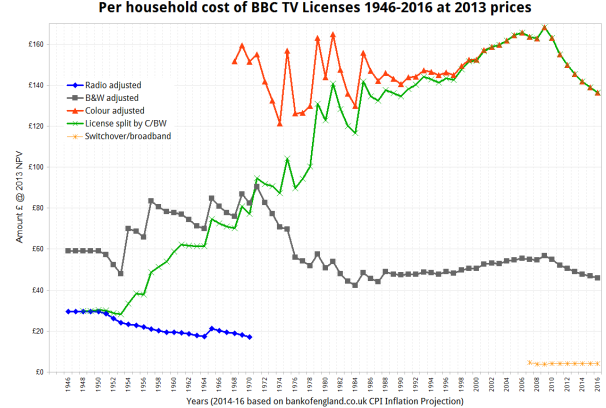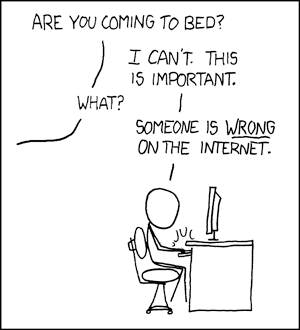I advise people on TV's,PVR's, etc. What they watch on them is their business.
ITV (or at least the franchises that make up ITV) started broadcasting in September 1955.
No, they didn't. DigitalUK made it very clear in the leaflet that was sent out to every household in the UK that all they needed to do was to make sure that their TV could get a digital signal. So all they needed to do was to buy a digitial receiver ('a gizmo' - which was about £18-25) if they didn't have one already, and part of the licence fee went towards that switchover, including paying for digiboxs (and even Sky) for certain categories of people.
Delighted as we were to sell people lots of new TV's and PVR's (a better idea for many anyway), we were more than happy to advise people what they really needed to get a digital signal (BTW - there is no such thing as a 'digital aerial', which scammed a fair number of people), and cautioned people about buying the wrong thing in a panic. Until last year, I had a CRT TV with a digibox, and it was fine. If people dumbed their old TV's, then it wasn't for lack of information or advice.
This can be answered at the same time as Dewi's '
So why not a 'We Cannae Git Na Stinkin Bradban Ya Wee Bazzas' license for those with intermittent or no signal to receive the iPlayer?' point.
The BBC gives lots of services (including stuff like LW, which is incredibly expensive considering just how few people use it), on lots of different platforms. They were nice enough to come up with Iplayer (which everyone else has copied), which, until this month, you didn't even need a TV licence to use. They can't be blamed if people dont want/can't have broadband (and the percentage of the population have used the internet is currently running around 87%), any more than you get a reduction on your licence because you can't listen to Radio 4 Extra, because you dont have a DAB radio. The TV Licence covers you having a TV/able to receive live TV - the rest is up to you. However, the licence fee is, in real terms, about as cheap as its been for a very long time - look at the chart below:

I dont like Capita either, but they now have the contract that the PO (now private of course) used to have, and they do a huge amount of work for the private and the public sector (hadn't heard of Paystation before). The TV Licencing website has a fair amount about which companies the BBC uses
http://www.tvlicensing.co.uk/about/foi-about-tv-licensing-AB15 , and the contract with Capita was renewed in 2011 and will run until 2020. The cost of the contract as announced was £560m. The cost for 2014-15 was £101.4m, which:
http://www.tvlicensing.co.uk/about/foi-financial-information-AB19
I'm not ignoring the 3,500 people going through the couts every week, but I am putting them in context. In 2015, there were 27m households. In March 2014, 95% of them had TV's or watched live TV on another device. So thats 25.65m households. TV Licencing estimate the evasion/non payment rate to be about 5.1%. Which means that 24.34m households just paid them (OK, sometimes with some prompting - they write just under a million letters a year, and a fair number then pay it).
Your quoted figure of 3,500 people a week equals 182,000 per year (I had a figure from 2013 of 178,332 people in England and Wales
https://recombu.com/digital/article/tv-licence-fee-myths-busted#, but add Scotland (15,000) and then a yearly varience, so close enough). 182k out of 25.65m is 0.709%. And out of that 178,332 people whose paperwork went through the courts that year, 153,369 were found guilty. So about 86%.
There are a number of anti-TV licence websites (with 'horror stories'), and a fair amount of footage of people filming TV Licencing Inspectors on Youtube. But there is no '
IhadavisitfromanicechapwhosaidthatstotallyOkbecauseyoudonthaveaTVandwewillputitonourrecords'com , nor is there any footage on Youtube of an licencing inspector looking at the back of someones TV, and saying, 'yes, thats fine, you've covered over the Belling Lee connection to the tuner and you've no aerial and your just watching DVD's. Have a nice day'.
Nor are there non angry letters in the papers saying 'I dont have a TV and dont pay the Licence Fee, but I do like listening to the radio, and really enjoy Ken Bruce's show in the morning'. Funny that.
As for whether the Tv Licence is good value, thats a very individual judgement.
True, no TV, no licence, no cost of the electricity, etc. However, the company paying for a product to be advertised anywhere still has to account for that cost, be it directly or indirectly. And that includes those teabags, the place you bought them from and the company who supplies the energy to boil the kettle.
No. Have a TV, dont have a TV, its up to the individual. However, if you've a TV/other device which can watch live TV, you need a licence. Freesat is pretty much Freeview for satellite users, and the channels that use it (which are very largely the same ones that use Freeview) pay to be part of it and be included in the EPG in much the same way. Using that platform has nothing at all to do with those 'who can't get the BBC' - its much more to do with what equipment you already have, and can you get a terrestial signal, and even if you can, how many channels you can get.
Once we get universal high speed (and by high speed, I mean South Korean high speed, not the UK version) broadband, we could stream everything. But thats unlikely to happen anytime soon, even if everyone wanted broadband, and the bandwidth needed would be vast, even without 4K. I've been promised jetpacks for a while, and they havn't happened either. And my broadband went down for a while last night, whereas the TV signal was perfect.
The Lords did stop an attempt at decriminalisation (and the Lords is the home of the great and the good, the sort of people who sit on the BBC Trust, etc), but frankly, the alternatives are currently unworkable. Advertising would bankrupt almost all the commercial channels, and subscription would require billion to be spent by all of us on new equipment and much increased annual costs, plus pretty much the death of public sector broadcasting. Even Whittingdale knew that, which was why he and his 'advisors' suggested 'voluntary subscription' to square the advantages of the licence fee with the ideological purity of its abolition (which didn't pass the laughter test).
And politicians can read polls - they know that they are generally much less popular than the BBC, and deciding on a course which results in getting rid of the Shipping Broadcast or Antiques Roadshow is tantamount to political suicide. The Labour Party, Lib Dems and all the nat. parties (the SNP has been stroppy, but they know where their bread is buttered) are all in favour of the BBC and the licence fee.
The BBC has always evolved, albeit often quite slowly in some areas, while being quite radical in others. Before WW2, the BBC could not report on events before they had been reported in the papers, lest the press barons faced competition. This didn't really work when the BBC was unable to report a bombing raid on London the listeners could hear live during a BBC broadcast. That changed. The BBC's monitoring service was direct result of WW2, and the World Service was a mix of broadcasting to Empire and the wartime broadcasting to the occupied countries. It was the BBC that introduced HD TV (as it then was) in 1964 (although the old 405 system had ben HD in 1936!), and its was BBC2 that was the first in Europe to introduce colour (the channels boss was David Attenborough - what happened to him?). And it was the BBC that introduced the worlds first teletext service, Ceefax, in 1974. They also developed NICAM, Iplayer, etc.
When the US Forces network during WW2 became more popular than the staid BBC programmes, the BBC stepped up popular entertainment (they did suggest jamming the US transmissions first!), and the same happened when the pirate stations started in the 60's - hence Radio 1, etc. So yes, the BBC has evolved, and will have to in the future.
 That's your own bias showing through.
That's your own bias showing through.

